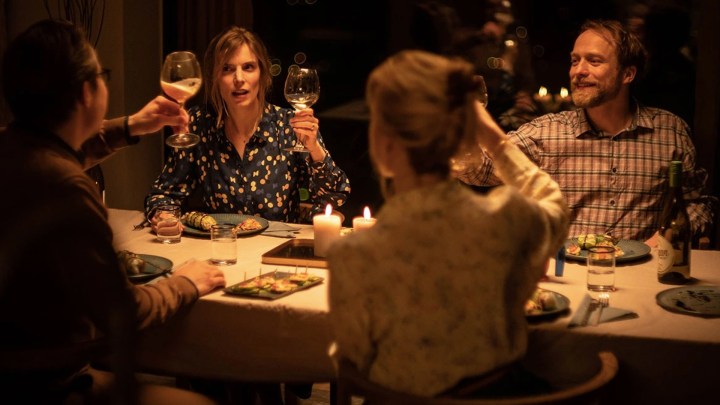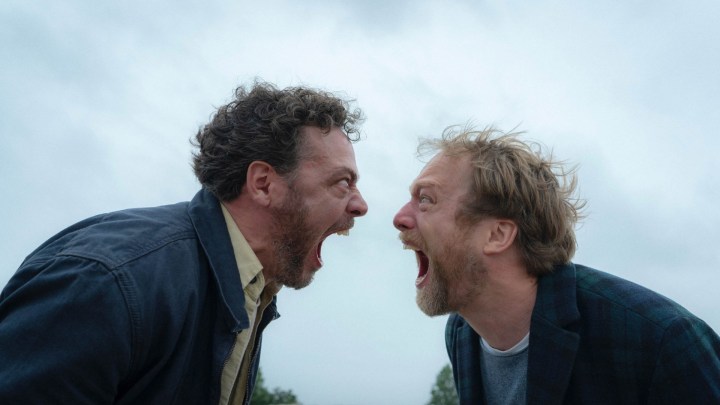Horror movies, even the very good ones, have a way of turning their audiences into backseat survivors: “Get out of the house already!” we scream at characters too stubborn or stupid to acknowledge the warning signs around them. It can be part of the communal fun of the genre, pleading aloud for the people on screen to get in touch with their self-preservation instincts.
Viewers will likely have some choice words (or maybe just groans) for the slow-to-flee characters of Speak No Evil. Here, the imperiled — a Danish family enduring a nightmare weekend in the Dutch boonies — actually do make the decision to get the hell out of dodge. Alas, they only go a couple of miles down the road before putting the car in reverse, their escape aborted upon the discovery that a beloved toy has been left behind. What’s more exasperating than someone refusing to get out of the house? How about watching them get out of the house, change their mind, and step right back into it?
To be fair, these fatally deferential Danes don’t necessarily have a reason to suspect that their lives are at risk. For all they know, the bad situation they’ve stumbled into deserves only discomfort, not fear. And that’s the ingenious, satirical design of Speak No Evil. This is more than a good horror movie. It’s a wickedly inspired and brutally effective one.

We’re introduced to eternally accommodating married couple Bjørn (Morten Burian) and Louise (Sidsel Siem Koch) in Tuscany, where they’ve traveled on holiday with their young daughter, Agnes (Liva Forsberg). It’s here that they meet Patrick (Fedja van Huêt) and Karin (Karina Smulders), another couple vacationing with their own young child, Abel (Marius Damslev), who doesn’t talk much. Patrick and Karin have a disarming openness. They also have the kind of relationship, passionate and free-spirited, that their new Danish friends might secretly envy. And so when Patrick and Karin invite them to their home in the Dutch countryside the following summer, Bjørn and Louise decide to take them up on the offer. “I think perhaps it would be impolite to decline,” they reason, before delivering some famous last words: “What’s the worst that could happen?”
At this point, alarm bells will be going off in the heads of horror fans, especially given the swell of ominous music that accompanies these seemingly unthreatening early scenes. But Speak No Evil doesn’t tilt immediately into the torture-porn scenario one might expect. What it offers instead is a slowly escalating social nightmare: A long weekend with strangers that becomes a gauntlet of slights, gaslighting, and crossed lines.
From almost the start, cracks begin to form in Patrick and Karin’s welcoming warmth, beginning with a general refusal to take Louise’s vegetarianism seriously. (She’s actually pescatarian, Patrick corrects, before grilling her about the environmental effects of the fishing industry.) From here, the hosts begin testing the limits of their guests’ patience and propriety — pressuring them into footing a hefty dinner bill, violating their privacy at all hours, and even having the gall to parent Agnes from the other side of the dinner table. Their own kid, Abel, apparently has a condition that makes speaking difficult. Patrick and Karin treat him with a brusqueness that borders on abuse. But what place is it for Bjørn and Louise to object?

One might think, during each grueling episode, of Ruben Östlund’s expertly calibrated cringe comedies, like Force Majeure and The Square. Writer-director Christian Tafdrup has a comparable talent for probing pressure points of class, gender, and domestic dissatisfaction. Among the numerous unspoken tensions underlying the film’s war of wills is the hint of trouble in paradise—the sense that Bjørn may not be entirely content with his life as a husband and father. You could say that much of what happens in Speak No Evil is, on some level, his fault. Tafdrup pushes the couple’s willingness to abide all manner of disrespect to near-absurdity, without sacrificing plausibility. Credit the four leads, who find notes of nuance in this pitch-black comedy of manners. Van Huêt is especially terrific as Patrick, turning on a dime from gregarious to menacing.
There might be something here, too, about the essential differences between the Dutch and the Danish. But Speak No Evil demands no expertise on European cultural mores. Anyone who’s ever felt trapped in an awkward social situation, or been reluctant to voice any objection to how they’ve been mistreated, will shudder in recognition. How much are we willing to put up with out of a fear of confrontation, or to avoid appearing rude? That’s the question posed by Patrick and Karin, house hosts from hell whose games of social terrorism are basically an indictment of politesse. They’re like if The Strangers dressed for a dinner party, and preyed on anyone constitutionally weak enough to let them.
If all of this sounds more Off-Broadway than midnight movie, more Edward Albee than Ed Gein, know that there’s a big payoff to Tafdrup’s games of abused etiquette. The closing stretch of Speak No Evil is a true dark night of the soul, harrowing and suffocatingly tense; it’s the stuff of hard horror, to be watched between closely held fingers. Still, what lingers in this queasy thriller are the calculated, compounding faux pas — a symphony of squirminess that becomes a cautionary tale on the dangers of acquiescence. Hold your tongue at your own peril.
Speak No Evil opens in select theaters on September 9 and begins streaming on Shudder September 15. For more of A.A. Dowd’s writing, please visit his Authory page.



